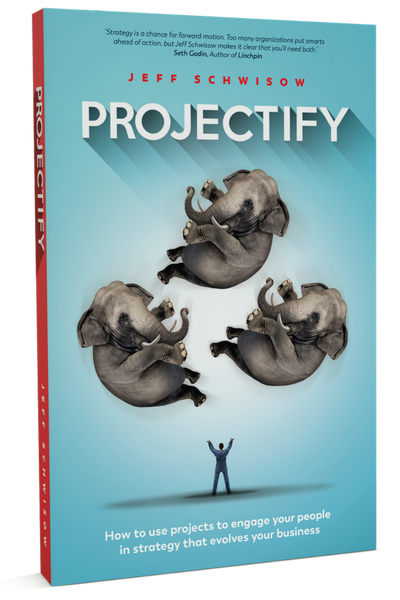Adaptation Management is the New Change Management
Inspired by the LinkedIn series on Big Ideas 2016, I have devoted my final blog of the year to my perspective on what I believe will be #BigIdeas2016 – Adaptation Management.
Change management has been around as a business process since the 1980s and is so entrenched in our organisational approach that it is now being taught as part of the curriculum in many business schools. Although not solely, a large part of change management principle and practice is focused on the people side of change – managing people’s resistance to the change we are trying to make. The relatively poor success rate of this attempt to “push” change past people’s natural inclination to resist it, has resulted in the perspective where there is a need to lead change so that you “pull” people on the change journey.

When we talk about change management in the context of project management, we are not looking to create a receptive environment for the change we are trying to implement. Instead, we are looking to control – and in most cases minimise – the amount of change that creeps into our projects. In this case, the principles and practices are focused on curbing people’s natural inclination to try to improve and enhance the product of their efforts – often in ways that have negative time and cost impacts.
The common thread between these two contradictory perspectives on managing change is that they perceive “change” as a shift – an incremental movement – from a static, steady-state environment. In the case of business change, from an undesirable state to a beneficial one; and in the case of project change management, from the desired path to one that threatens the pre-conceived boundaries of time and cost.
This commonality is in fact a common flaw in our thinking. The business environment in 2016 (and beyond) will be far too dynamic to simply tick along in a steady-state condition with only periodic incremental step change. It’s too slow…particularly when the incremental change is only successful about a third of the time. Similarly, projects are far too dynamic to inhibit a team’s desire to improve and enhance them through continuous change. It erodes the outcome and ultimately disengages and demotivates the team.
In 2016, thriving businesses will move away from trying to manage clunky change programs within their organisation. They will create a framework where change is continuous. They will create a team that is constantly adapting to the environment that their organisation operates within. Adaptation management will become the new change management.
Adaptation will begin to mean more than reacting to disruptive influences. It will also mean recognising and seizing opportunities that either the market or the business’s own performance has created. For many businesses, it will mean becoming the disruptive influence in their market – the ones that their clients seek out and their competitors are defending against. Effective adaptation management will mean doing it right now – before the window of opportunity passes, before the innovative momentum is lost or before that disruptive influence is a hole in their profit and loss statement that they’re trying to fill.
Successful adaptation management is an amalgamation of the two change management perspectives discussed above. Instead of trying to change people in order to manage change, we need to utilise the natural inclinations of our people to pursue mastery and purpose to continuously drive adaptive change into our organisation and teams. Rather than minimise the change that occurs on our projects, we want to utilise the naturally dynamic environment on projects to explore opportunities and innovative ideas to maximise the benefit of change to our organisation.
Adaptation management will mean creating a steady stream of quality projects that either look to improve the business, develop and operationalise innovations or respond to changing market conditions. The organisation’s employees won’t need to be made to buy into these projects – they will be the source of them. Staff won’t need to be cajoled into accepting the business changes that come from these projects – projects will become the business’s new normal. Adaptive projects will no longer be met with resistance from the team – they will bring the team together and be the source of motivation and engagement.
Leadership will no longer be about changing the way the organisation’s people think, it will instead look to harness people’s thinking and their intrinsic need to be a part of something larger than themselves. Leadership will not focus on controlling behaviours, but instead will focus on creating a strategic vision for next the business frontier and support the team in transforming that vision into business value.
In 2016, business adaptation will shrug off the negative connotations of change management and re-engineering programs of the past which were high on disruption but low on business value. The adaptive business will bring with it the aura of an organisation that is completely in touch with the needs and wants of its market – in some cases helping to shape those needs and wants. A place where customers are eager to invest their hard-earned money. A business that competitors look to emulate or defend against. A workplace where the culture – not the payroll – attracts and retains the best talent.
Questions for consideration in 2016:
- How will you set your business up to adapt to the shifting business landscape that lies ahead?
- Are you leading through continuous adaptation or incremental change?
- What do you think the most successful organisations are currently doing?
Thanks for your time, and I wish you and your family a healthy and happy holiday season. I look forward to connecting with you in 2016.




Leave a Reply
Want to join the discussion?Feel free to contribute!